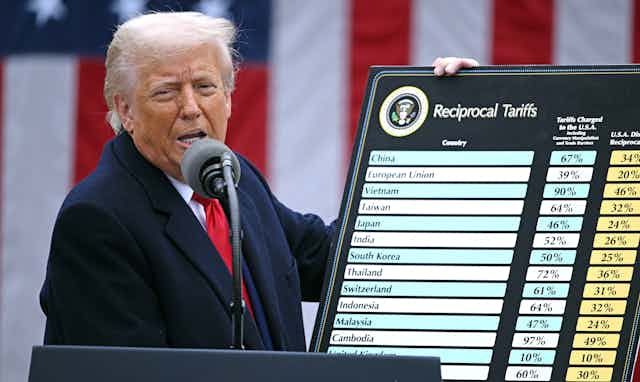Europes most admired fascist by right-wing politicians takes it a bit further.
Photo: EPA/Zoltan Mathe
Orban‘s power grab is equally unprecedented as it is autocratic. The Parliament‘s decree has enabled Hungary‘s strongman to rule indefinitely- and unchecked. The ball is now in the Commission‘s court.#coronavirus #autocracy #Hungary #victororban #EuropeanCommission #Hungary pic.twitter.com/4mUM4VHqxO
— Forum.eu (@forumdoteu) March 31, 2020
Meanwhile, Victor #Orban in #Hungary https://t.co/9dY7HZLO7Z #politicalcartoon #victororban
— STARAVIS.COM (@staravisen) March 31, 2020
Umut Korkut, Glasgow Caledonian University
On top of the health crisis it has created, the coronavirus emergency is providing authoritarian governments with a new tool to consolidate control. One of the most striking examples so far has been in Hungary, where the parliament has voted to allow the government of prime minister Viktor Orbán the power to rule by decree – effectively indefinitely. This means that the government can do anything that it considers important to fight against the coronavirus.
Parliament can, technically vote to end this extra power, but Orbán’s party Fidesz has a two-thirds majority. The Constitutional Court can investigate the legality of any governmental decrees Orbán produces, but again, he has made sure it is packed full of judges chosen by his party. It has been a long time since the court last voted against the government. The legislation therefore effectively delivers the country to Orbán in full, without any checks and balances.
Fidesz has also introduced a clause that prevents any by-elections or referendums from being held during the crisis – although national parliamentary elections are still scheduled for 2022.
The Hungarian opposition has recently sought to use such electoral mechanisms to undermine the Orbán government, winning key votes such as the mayoral election in Budapest by building anti-Fidesz alliances.
Post-coronavirus politics
The Hungarian situation offers us a glimpse of how world politics may function during and after the coronavirus crisis unless we give it careful thought.
There is a widespread belief that the Chinese style of governance won the war against the coronavirus there. China showed the West how to manage the spread of the disease, by taking extreme authoritarian measures to keep people on lockdown and slow the spread of infection. Faced with the prospect of tens of thousands – even hundreds of thousands – of deaths, such actions have never looked more tempting to Western governments.
Orbán has already demonstrated his desire to distance Hungary from its European Union partners to develop closer ties with authoritarian states to the east, such as the Central Asian republics and Turkey. Orbán proudly calls Hungary the most westerly nation in the The Turkic Council – referencing the country’s observer status in that alliance.
And, endorsing China’s credentials in the fight against the coronavirus, Orbán himself and the Chinese ambassador to Budapest met a Chinese plane with medical supplies at Budapest Airport. Orbán convivially met the ambassador with elbow greetings.

Orban greets a Chinese delegation bringing supplies. EPA
He was quick to highlight the help Hungary had received from China and the Turkic Council when arguing that the EU failed to provide it.
Avoiding scrutiny
It is also noteworthy that Hungary has formally declared a “state of emergency” to justify its new powers. This is a very rare instrument in most European countries, but was used by Turkey to justify generous extra government powers in the wake of the failed coup of 2016. Turkey then even asked for a derogation from the European Convention on Human Rights during this period.
Several European nations have declared states of emergency to manage the coronavirus crisis, granting extra powers to limit the movement of citizens. But Hungary stands out for the severe punishment clauses included in its legislation. Under its provisions, intentionally spreading false information about the virus will be punishable by a prison sentence of up to five years.
It is true that one of the challenges for governments and health practitioners amid the coronavirus crisis is fake news on social media. But the Hungarian false information clause is very vague, suggesting that spreading rumour or alarming news could be punishable. Besides, given much enfeebled media freedom in the country, social media becomes a venue for information for much of the public. Again, it seems to grant the government enormous freedom to make the call.
To assess where all this could go, we need only look at how the Fidesz political machine has operated in the past. Orbán has always claimed legitimacy by popular election but he has a record for exploiting crises to entrench its executive rule. During Europe’s “refugee crisis” of 2015, the government declared a “state of crisis due to mass migration” giving unfettered powers to the army and the police to quash unrest. Looking at this precedent, there is room to argue that the government will exploit the coronavirus crisis to its own benefit.
The Hungarian case shows how governments are able to sidestep parliaments to avoid accountability. In the UK, as an example, the British parliament has effectively waved through extra powers for Boris Johnson’s government. But that legislature can have some confidence that the Supreme Court will step in if Johnson tries to exploit the situation. It has, after all, recently done so in another case.
The weakened judiciary in Hungary does not look ready for action. The European Union continues to remain reticent about intervening, given how tense relations have already become. This all leaves ample room for Orbán to use the coronavirus crisis as yet another laboratory for experimenting with the limits of parliamentary power.![]()
Umut Korkut, Chair professor, Glasgow Caledonian University
This article is republished from The Conversation under a Creative Commons license. Read the original article.





12 Comments
Pingback: sleep meditation
Pingback: forschungschemikalien
Pingback: ประโยชน์ของการทดลองเล่น slot บนเว็บ LSM99
Pingback: sell drugs
Pingback: ufazeed
Pingback: omega cheats r6
Pingback: gray zone warfare hacks
Pingback: เช่าจอLED
Pingback: เน็ต AIS
Pingback: Jaxx Liberty
Pingback: PGSLOT รวมเกมออนไลน์บนมือถือ สมัครใหม่ รับโบนัส100%
Pingback: Paket Bulan Madu Ke Bali